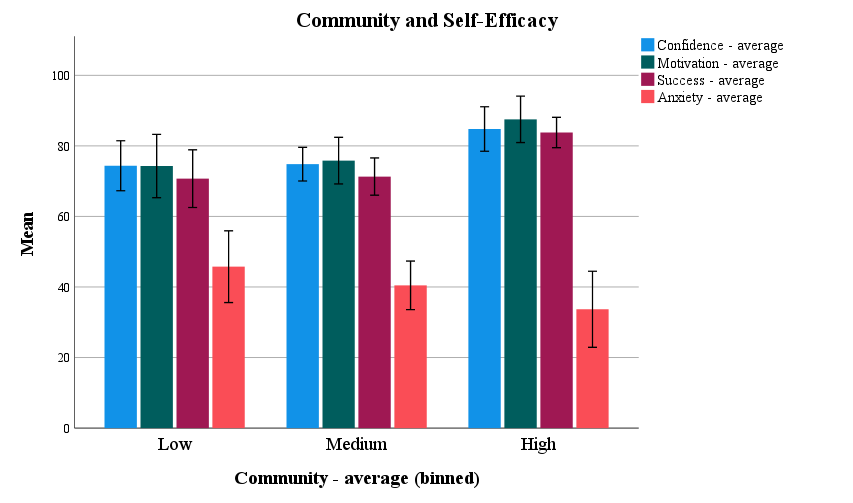Self-efficacy research (2020-21)
Summary
Link to full thesis here
For my Master's research, I examined students’ beliefs of their own engineering capacity (self-efficacy) in hands-on classes that operated remotely and
found correlations between feelings of class community and engineering design self-efficacy.
Key Skills
- Study design
- Data analysis
- Survey design and distribution
- Research presentation
Background & Motivation
As both a graduate student and a teaching assistant at the start of the pandemic, I observed significant differences in students in remote classes.
To investigate further, I started my research by speaking informally to professors, TA's, and students.
I began to hear common themes emerging around class community, including when students ask for help and how students collaborate.
I decided to study the relationship between self-efficacy and classroom sense of community.
A sense of community in online learning has been found to correlate with higher perceived learning and lower feelings of isolation.
Community and a sense of belonging has also been shown to be vital for under-represented minority students, especially in engineering.
Self-efficacy is one measure of student experience in a class.
Self-efficacy is generally defined as a person's belief in their own capacity to successfully complete a certain task.
A student with high self-efficacy will generally feel more confident towards a given task and feel that any failure in that task is
a result of lack of effort rather than lack of ability. Multiple factors have been shown to affect self-efficacy, including level of stress
(negative effect) and vicarious experiences (positive effect).
Demographics such as gender and race have also been shown to correlate with self-efficacy towards specific tasks.
I predicted that students in remote classes (especially those that taught new, hands-on skills) would be missing many of the vicarious experiences that come more naturally during in-person lab classes.
My hypothesis was that engineering design self-efficacy will vary by demographics (gender, race, year) but students with a strong sense of community/engagement will feel more self-efficacy in a remote setting.
Methods
I surveyed students in two classes that both taught engineering design skills to mostly remote students.
I designed a survey with questions about engagement, community, and self-efficacy.
To evaluate the survey results, I used t-tests and ANOVA.
Results
The survey showed that students who reported higher levels of class community also tended to report higher levels of self-efficacy towards engineering design.
This result was especially strong among female-identifying students, which is consistent with literature.
Level of engagement (i.e. going consistently to office hours) was not correlated with self-efficacy, which seems to indicate that self-efficacy is derived from more than consistent attendance.
I found that remote students rated their level of motivation significantly (p = 0.040) higher than in-person students in the same class.
I also found that students who identified as female reported higher levels of engagement (p = 0.004) than male-identifying students.
Finally, non-URM identifying students reported higher levels of motivation (p = 0.002) and lower levels of anxiety (p = 0.030).
